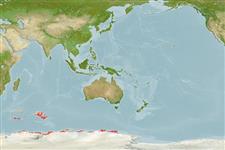Solanometra antarctica (Carpenter, 1888)
| Native range | All suitable habitat | Point map | Year 2050 |

|
| This map was computer-generated and has not yet been reviewed. |
| Solanometra antarctica AquaMaps Data sources: GBIF OBIS |
Google image |
No photo available for this species.
Classification / Names প্রচলিত নাম সমূহ | প্রতিনাম সমূহ | CoL | ITIS | WoRMS
Crinoidea | Comatulida | Antedonidae
Environment: milieu / climate zone / গভীরতার পরিসীমা / distribution range বাস্তুসংস্থান
; গভীরতার পরিসীমা 137 - 274 m (সূত্র 87801). Polar
Distribution দেশ সমূহ | এফ এ ও এলাকাসমূহ | বাস্তুতন্ত্র | দৃষ্টিগোচর | প্রচলন
Southeast Pacific and Antarctic.
Length at first maturity / আকৃতি / Weight / Age
পরিপক্কতা : Lm ? range ? - ? cm
Life cycle and mating behavior পরিপক্কতা | প্রজনন | ডিম ছাড়া | Eggs | ডিম্বধারন ক্ষমতা | Larvae
Main reference
সূত্র সংখ্যা | সমম্বয়কারী | সহযোগী
Arnaud, P.M. 1974 Contribution à la bionomie marine benthique des régions antarctiques et subantarctiques. Téthys 6(3):467-653. (সূত্র 86525)
IUCN Red List Status
(সূত্র 130435: Version 2025-1)
CITES status (সূত্র 108899)
CMS (সূত্র 116361)
Threat to humans
Human uses
| FishSource |
হাতিয়ার
আরো তথ্য
পথ্য উপাদান
খাদ্য গ্রহণ
শিকারী প্রাণী সমূহ
Max. ages / sizes
Length-weight rel.
Length-length rel.
Length-frequencies
Mass conversion
প্রাচুর্য
ইন্টারনেট সুত্র
BHL | BOLD Systems | CISTI | DiscoverLife | FAO(Publication : search) | Fishipedia | GenBank (genome, nucleotide) | GloBI | Gomexsi | Google Books | Google Scholar | Google | PubMed | জীবন বৃক্ষ | Wikipedia (Go, অনুসন্ধান ) | জুলজিকাল রেকর্ড


